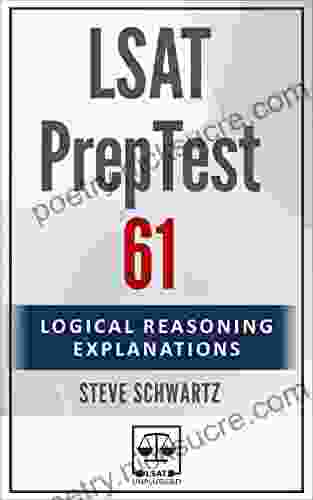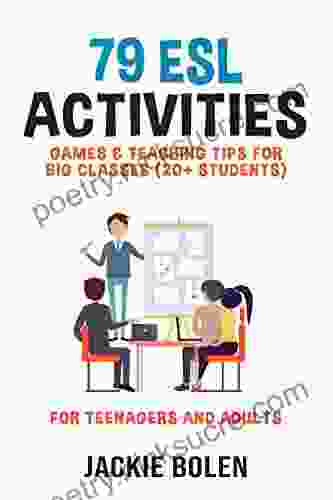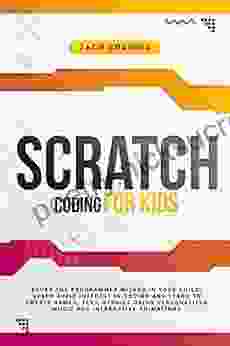Logical Reasoning Explanations: The Ultimate Guide to Mastering the LSAT Preptest

: Unveiling the Essence of Logical Reasoning
The Law School Admission Test (LSAT) is a standardized exam that assesses critical thinking and analytical reasoning skills essential for success in law school. Logical Reasoning, one of the three core sections of the LSAT, presents you with complex arguments and requires you to evaluate their validity, identify flaws, and draw inferences. Mastering Logical Reasoning is crucial for maximizing your LSAT score and securing admission to your desired law school.
This comprehensive guide will delve into the intricacies of Logical Reasoning, providing you with a structured and systematic approach to conquering the challenges of the LSAT Preptest. We will explore:
4.2 out of 5
| Language | : | English |
| File size | : | 1631 KB |
| Text-to-Speech | : | Enabled |
| Screen Reader | : | Supported |
| Enhanced typesetting | : | Enabled |
| Word Wise | : | Enabled |
| Print length | : | 99 pages |
- Types of Logical Reasoning Questions
- Identifying Argument Structure
- Analyzing Arguments for Validity and Flaws
- Drawing Inferences and Evaluating Assumptions
- Strengthening and Weakening Arguments
- Practice and Application of Logical Reasoning Techniques
Types of Logical Reasoning Questions
The LSAT Preptest presents a diverse range of Logical Reasoning question types, each requiring a specific approach:
- Must Be True: Questions where you must identify a that must logically follow from the premises.
- Inference: Questions that ask you to draw a reasonable inference from the provided information.
- Assumption: Questions that require you to identify an unstated assumption that is necessary for the argument to be valid.
- Flaw: Questions where you must identify the flaw or weakness in the argument's reasoning.
- Parallel Reasoning: Questions that present two arguments and ask you to identify which argument is stronger or has a similar flaw.
- Strengthening: Questions that ask you to select an answer choice that would strengthen the argument.
- Weakening: Questions that ask you to select an answer choice that would weaken the argument.
Identifying Argument Structure
The foundation of Logical Reasoning lies in understanding the structure of arguments. Arguments typically consist of a:
- Claim: The main assertion or that the argument supports.
- Evidence: Facts, examples, or reasons that support the claim.
- Inferences: Logical connections between the evidence and the claim.
- Assumptions: Unstated beliefs or premises that are necessary for the argument to be valid.
Identifying these components will help you deconstruct the argument and evaluate its validity.
Analyzing Arguments for Validity and Flaws
To excel in Logical Reasoning, you must develop the ability to assess the validity of arguments. A valid argument is one where the evidence logically supports the . Common flaws to look for include:
- Circular Reasoning: Assuming the in the premises.
- Appeal to Emotion: Using emotional appeals instead of logical reasoning.
- Non Sequitur: Drawing a that does not follow from the premises.
- Equivocation: Using a term with multiple meanings to create confusion.
- Overgeneralization: Making a broad based on limited evidence.
Drawing Inferences and Evaluating Assumptions
Drawing inferences involves identifying logical connections between the premises and the claim. Inferences must be reasonable and supported by the evidence. Evaluating assumptions involves identifying unstated beliefs that are necessary for the argument to be valid. Assumptions can be explicit or implicit.
Strengthening and Weakening Arguments
Strengthening an argument involves selecting an answer choice that provides additional support for the claim. Weakening an argument involves selecting an answer choice that introduces a flaw or casts doubt on the validity of the argument.
Practice and Application of Logical Reasoning Techniques
Mastering Logical Reasoning requires consistent practice. Here are some tips:
- Take timed practice tests to simulate the actual LSAT experience.
- Analyze your mistakes and identify areas where you need improvement.
- Use logical reasoning techniques to solve problems in everyday life.
: Unlocking the Secrets of Logical Reasoning
By following the strategies outlined in this guide, you will develop a strong foundation in Logical Reasoning and conquer the challenges of the LSAT Preptest. Remember, the key to success lies in understanding argument structure, identifying flaws, and applying logical reasoning techniques. With perseverance and dedication, you can unlock the secrets of Logical Reasoning and achieve your law school admission goals.
4.2 out of 5
| Language | : | English |
| File size | : | 1631 KB |
| Text-to-Speech | : | Enabled |
| Screen Reader | : | Supported |
| Enhanced typesetting | : | Enabled |
| Word Wise | : | Enabled |
| Print length | : | 99 pages |
Do you want to contribute by writing guest posts on this blog?
Please contact us and send us a resume of previous articles that you have written.
 Fiction
Fiction Non Fiction
Non Fiction Romance
Romance Mystery
Mystery Thriller
Thriller SciFi
SciFi Fantasy
Fantasy Horror
Horror Biography
Biography Selfhelp
Selfhelp Business
Business History
History Classics
Classics Poetry
Poetry Childrens
Childrens Young Adult
Young Adult Educational
Educational Cooking
Cooking Travel
Travel Lifestyle
Lifestyle Spirituality
Spirituality Health
Health Fitness
Fitness Technology
Technology Science
Science Arts
Arts Crafts
Crafts DIY
DIY Gardening
Gardening Petcare
Petcare Todd Radom
Todd Radom Freddy Silva
Freddy Silva Cb Droege
Cb Droege Pierluigi Barrotta
Pierluigi Barrotta Steve Schwartz
Steve Schwartz Naomi Tomky
Naomi Tomky Katie Krimer Ma Lcsw
Katie Krimer Ma Lcsw Laurie Varga
Laurie Varga Philip Gibson
Philip Gibson Steve Olson
Steve Olson Stacey Williams
Stacey Williams Joyce Meyer
Joyce Meyer Nisha Garg
Nisha Garg Scott P Sells
Scott P Sells Junior Health Institute
Junior Health Institute Arcturus Publishing
Arcturus Publishing Isaac Fitzsimons
Isaac Fitzsimons Ann Marie Brown
Ann Marie Brown Jacqueline Winslow
Jacqueline Winslow Margaret Rogerson
Margaret Rogerson Roy R Grinker
Roy R Grinker Peter L Falkingham
Peter L Falkingham Zach Codings
Zach Codings Oskar Morgenstern
Oskar Morgenstern Zach Hunter
Zach Hunter Sara Wickham
Sara Wickham Margaret Jean Langstaff
Margaret Jean Langstaff Nicholas Thomas
Nicholas Thomas Gloria Chadwick
Gloria Chadwick Claire Walter
Claire Walter Fumio Sasaki
Fumio Sasaki Hanumant Deshmukh
Hanumant Deshmukh Mikael Lindnord
Mikael Lindnord Steve Bowkett
Steve Bowkett Anne Sylvie Malbrancke
Anne Sylvie Malbrancke Larry Semento
Larry Semento Worley Faver
Worley Faver Christine Hopfgarten
Christine Hopfgarten John Baichtal
John Baichtal Valerie Hansen
Valerie Hansen Kalman Samuels
Kalman Samuels Holly Bourne
Holly Bourne Sean Purchase
Sean Purchase H Jerome Chapman
H Jerome Chapman Tyler Richards
Tyler Richards Heidi Kreider
Heidi Kreider Tanmay Mehta
Tanmay Mehta Stefan Hollos
Stefan Hollos Adil E Shamoo
Adil E Shamoo Jemar Tisby
Jemar Tisby Christelle Dabos
Christelle Dabos R A Salvatore
R A Salvatore Dan Koboldt
Dan Koboldt Lily Dunn
Lily Dunn Rick Sparkman
Rick Sparkman Louis Van Dyke
Louis Van Dyke Craig Ramsay
Craig Ramsay Joshua Shifrin
Joshua Shifrin Zoe Moore
Zoe Moore Breeda Bermingham
Breeda Bermingham Christopher Seddon
Christopher Seddon Sean Bartram
Sean Bartram Ellen Painter Dollar
Ellen Painter Dollar Ruby Mcconnell
Ruby Mcconnell C J Brown
C J Brown Creative Guy
Creative Guy E R Truitt
E R Truitt Dana James
Dana James Elisabeth Haich
Elisabeth Haich Timothy P Schultz
Timothy P Schultz Wendy Leo Smith
Wendy Leo Smith Linda K Miller
Linda K Miller Good Books
Good Books Boye Lafayette De Mente
Boye Lafayette De Mente Aaron Mahnke
Aaron Mahnke Steven Munatones
Steven Munatones Chronicle Books
Chronicle Books Julie Creffield
Julie Creffield Annabel Streets
Annabel Streets Kristian Berg
Kristian Berg Ben Shneiderman
Ben Shneiderman Kendall Coyne
Kendall Coyne George James Grinnell
George James Grinnell Paul Bloom
Paul Bloom Steve Oldenburg
Steve Oldenburg Susan Straub
Susan Straub Anna Quindlen
Anna Quindlen The Pinnacle Review
The Pinnacle Review Peyton Curley
Peyton Curley Steven Callahan
Steven Callahan Trevor Hartman
Trevor Hartman John Dunn
John Dunn Buddy Lee
Buddy Lee Dave Canterbury
Dave Canterbury Gwen Mckee
Gwen Mckee Randall Fitzgerald
Randall Fitzgerald Robert A Cook
Robert A Cook Harley Mcallister
Harley Mcallister J E Esslemont
J E Esslemont Suzanne I Barchers
Suzanne I Barchers Michael F Nenes
Michael F Nenes Melissa Mortenson
Melissa Mortenson Roy M Wallack
Roy M Wallack Dr Sarita Uhr
Dr Sarita Uhr Skeleton Steve
Skeleton Steve Ian Moulding
Ian Moulding Martin N Seif
Martin N Seif Danny Jones
Danny Jones Jacob Ward
Jacob Ward James C Zimring
James C Zimring Gemma Bray
Gemma Bray Peter Richmond
Peter Richmond Chase Hassen
Chase Hassen Paul Logothetis
Paul Logothetis Emily J Taylor
Emily J Taylor Matthew Locricchio
Matthew Locricchio William Goldman
William Goldman Asker Jeukendrup
Asker Jeukendrup Jonathan Franklin
Jonathan Franklin Justine Gregory Williams
Justine Gregory Williams Julia Galef
Julia Galef Neel Doshi
Neel Doshi Ling Seto
Ling Seto Charles J Sanders
Charles J Sanders Jay Allan
Jay Allan Winton Porter
Winton Porter L J Martin
L J Martin P M Gilbert
P M Gilbert Jay Spence
Jay Spence Walter Mischel
Walter Mischel Victor Stringer
Victor Stringer Sandy Camillo
Sandy Camillo Emmett W Hines
Emmett W Hines Steven Yellin
Steven Yellin Dave Whitlock
Dave Whitlock John Dickson
John Dickson L Chapman
L Chapman W W Sawyer
W W Sawyer Antonio Robert
Antonio Robert Jennifer Dugan
Jennifer Dugan Genevieve Mckay
Genevieve Mckay Sukhveer Singh
Sukhveer Singh Christina Henry De Tessan
Christina Henry De Tessan Julian Of Norwich
Julian Of Norwich Omari Bouknight
Omari Bouknight Jay Young
Jay Young Prime Hall
Prime Hall Jill Lepore
Jill Lepore Steve Newell
Steve Newell Todd Denault
Todd Denault Janine Marsh
Janine Marsh Kristina Cowan
Kristina Cowan Mordecai Orimiladeye
Mordecai Orimiladeye Les Livingstone
Les Livingstone Zach Davis
Zach Davis Howard Means
Howard Means R K Agarwal
R K Agarwal Matthew Rudy
Matthew Rudy Damian Hall
Damian Hall Bruce Lockwood
Bruce Lockwood Bob Labbe
Bob Labbe Dan Gardner
Dan Gardner Rebecca A Moyes
Rebecca A Moyes Barry Schwartz
Barry Schwartz Alex Bromley
Alex Bromley Suzanne Girard Eberle
Suzanne Girard Eberle Bert Mendelson
Bert Mendelson Timothy Ellis
Timothy Ellis Darryl Belfry
Darryl Belfry Lisa Manterfield
Lisa Manterfield Jennifer L Lopez
Jennifer L Lopez Mike Reilly
Mike Reilly Tarani Chandola
Tarani Chandola Michael Witwer
Michael Witwer Ann Voskamp
Ann Voskamp Helge Kragh
Helge Kragh Anna Della Subin
Anna Della Subin Steven G Krantz
Steven G Krantz Pawel Malczewski
Pawel Malczewski Chic Scott
Chic Scott John O Sullivan
John O Sullivan Dr Harper
Dr Harper Miley Smiley
Miley Smiley Philip Reed
Philip Reed Barbara Sealock
Barbara Sealock June Hur
June Hur Sarah Stodola
Sarah Stodola Thomas A Garrity
Thomas A Garrity Sandy Bodeau
Sandy Bodeau Scott Allan
Scott Allan Finn Aagaard
Finn Aagaard Frank Thomas
Frank Thomas Joey Myers
Joey Myers Lexi Ryan
Lexi Ryan Neal Shusterman
Neal Shusterman Tim Young
Tim Young Illysa R Foster
Illysa R Foster Geryn Childress
Geryn Childress Christopher T Coughlin
Christopher T Coughlin Patrick Torsell
Patrick Torsell Joy Dawson
Joy Dawson Lina Beard
Lina Beard Kennedy Achille
Kennedy Achille Tony Osgood
Tony Osgood Helen Adrienne
Helen Adrienne Nancy Marie White
Nancy Marie White Sharon Rowley
Sharon Rowley Zena Hitz
Zena Hitz Mike Roberts
Mike Roberts G Norman Lippert
G Norman Lippert Anna B Doe
Anna B Doe Earl Hipp
Earl Hipp Joe Hyams
Joe Hyams Richard Appleton
Richard Appleton Peter Wacht
Peter Wacht Seth Stephens Davidowitz
Seth Stephens Davidowitz Annaka Harris
Annaka Harris Jessa Stone
Jessa Stone John Murray
John Murray Louise Katz
Louise Katz John Edwards
John Edwards Daniel Isberner
Daniel Isberner Michael Tan
Michael Tan Jennifer Kostick
Jennifer Kostick Julie A Ross
Julie A Ross Bethany Saltman
Bethany Saltman Tara Haelle
Tara Haelle Henry Dillon
Henry Dillon Josephine Mccarthy
Josephine Mccarthy Ken Robinson
Ken Robinson Kate Mcvaugh
Kate Mcvaugh Dan Vogel
Dan Vogel Eric Greitens
Eric Greitens Margaret Paul
Margaret Paul Melvin Fitting
Melvin Fitting Larry Thornberry
Larry Thornberry Pradeepa Narayanaswamy
Pradeepa Narayanaswamy Sherry B Ortner
Sherry B Ortner Mark Mckinney
Mark Mckinney Randy J Paterson
Randy J Paterson Matthew Cobb
Matthew Cobb Angela Saini
Angela Saini Karen Bassie Sweet
Karen Bassie Sweet Curtis Collins
Curtis Collins Peter Hathaway Capstick
Peter Hathaway Capstick Holly Chism
Holly Chism Bob Madgic
Bob Madgic Martin Meredith
Martin Meredith Tali Sharot
Tali Sharot Stuart Tomlinson
Stuart Tomlinson Elizabeth Wissner Gross
Elizabeth Wissner Gross Richard C Schwartz
Richard C Schwartz Glen E Clarke
Glen E Clarke Ariel Dalfen
Ariel Dalfen Ralph Waldo Emerson
Ralph Waldo Emerson Maggie Downs
Maggie Downs Dave Hall
Dave Hall Geoff Greig
Geoff Greig Eleanor J Sullivan
Eleanor J Sullivan Annette Burns
Annette Burns Joanna Wells
Joanna Wells Marjorie Savage
Marjorie Savage Maya Van Wagenen
Maya Van Wagenen Johnny Chuong
Johnny Chuong Ford R Bryan
Ford R Bryan Bob Cary
Bob Cary Susan Spicer
Susan Spicer Stephen J Pyne
Stephen J Pyne Patricia Ladis
Patricia Ladis Anna Bright
Anna Bright Mark Matlock
Mark Matlock Bernard Stiegler
Bernard Stiegler M Terese Verklan
M Terese Verklan Barry Dainton
Barry Dainton Adele Faber
Adele Faber Sheela Raja
Sheela Raja Jean Barbre
Jean Barbre Shannon Vallor
Shannon Vallor Shawn Shallow
Shawn Shallow Rebecca Carroll
Rebecca Carroll Jackson Carter
Jackson Carter Stefanie Japel
Stefanie Japel Lane Demas
Lane Demas Harnarayan Singh
Harnarayan Singh Dorothy Ours
Dorothy Ours David Woods
David Woods Horace Kephart
Horace Kephart Sajni Patel
Sajni Patel Charlene Beswick
Charlene Beswick Quinn Loftis
Quinn Loftis Stephen Tarsitano
Stephen Tarsitano Gilbert J Grant Md
Gilbert J Grant Md Donna D Ignatavicius
Donna D Ignatavicius Jason
Jason Richard A Swanson
Richard A Swanson Harold Davis
Harold Davis Nicholas Clapp
Nicholas Clapp Michael Labossiere
Michael Labossiere David Soucie
David Soucie Illustrated Edition Kindle Edition
Illustrated Edition Kindle Edition Gary Chapman
Gary Chapman Will Kurt
Will Kurt Susan M Schneider
Susan M Schneider Douglas Perry
Douglas Perry Barb Musick
Barb Musick Dave Hughes
Dave Hughes Sally Connolly
Sally Connolly Hannah Testa
Hannah Testa Sara Dyer
Sara Dyer Richard A Ruth
Richard A Ruth Sparknotes
Sparknotes Ichigo Takano
Ichigo Takano J Scott Long
J Scott Long Suzanne Clark
Suzanne Clark Stephanie Cave
Stephanie Cave Judy Corry
Judy Corry Dante Fortson
Dante Fortson H M Schey
H M Schey Caroline Miller
Caroline Miller Vladimir Vasiliev
Vladimir Vasiliev Eddie Jones
Eddie Jones Cathy Glass
Cathy Glass Ray Moynihan
Ray Moynihan John Gignilliat
John Gignilliat Rick Page
Rick Page Brian Daccord
Brian Daccord Fox Fisher
Fox Fisher William P Young
William P Young Alexander L Chapman
Alexander L Chapman Graham Robb
Graham Robb Noel D Justice
Noel D Justice Robert Gerver
Robert Gerver Chris Bailey
Chris Bailey Morton Manus
Morton Manus Kyung Won Chung
Kyung Won Chung Malcolm S Thaler
Malcolm S Thaler James C Scott
James C Scott Jenny Jacobs
Jenny Jacobs Wayne C Booth
Wayne C Booth Sean Covey
Sean Covey Clive Scarff
Clive Scarff Jenn Bennett
Jenn Bennett Hope Comerford
Hope Comerford Scott Shupe
Scott Shupe Katharine Beals
Katharine Beals Melanie Dickerson
Melanie Dickerson Frances Schultz
Frances Schultz Steve Bennett
Steve Bennett Marie Cirano
Marie Cirano George Lakoff
George Lakoff Anna Ivey
Anna Ivey Anna Crowley Redding
Anna Crowley Redding Christine Field
Christine Field Sam Demas
Sam Demas James Burke
James Burke Kristen L Mauk
Kristen L Mauk Crystal Cook
Crystal Cook Hill Harper
Hill Harper John Pullen
John Pullen Monroe Wildrose
Monroe Wildrose Stan Gibilisco
Stan Gibilisco Susan G Solomon
Susan G Solomon Ann Mccallum Staats
Ann Mccallum Staats C W Farnsworth
C W Farnsworth Annalyn Ng
Annalyn Ng Ellen Dugan
Ellen Dugan L J Smith
L J Smith Ann Valett
Ann Valett Richard Mcafee
Richard Mcafee Kathy Morey
Kathy Morey Steven A Fino
Steven A Fino Julie C Meloni
Julie C Meloni L A Cotton
L A Cotton Tim Cahill
Tim Cahill Shelley Emling
Shelley Emling Linda Lewis Alexander
Linda Lewis Alexander Becky Wade
Becky Wade Cade Courtley
Cade Courtley Chris Gore
Chris Gore Robert A Conover
Robert A Conover Vittal S Anantatmula
Vittal S Anantatmula Michael Hodgson
Michael Hodgson Dean Buonomano
Dean Buonomano Chris Fregly
Chris Fregly James P Sethna
James P Sethna Julian Havil
Julian Havil Sally Annjanece Stevens
Sally Annjanece Stevens Krista Marson
Krista Marson Lizzie Collingham
Lizzie Collingham Livia Bitton Jackson
Livia Bitton Jackson Anna Lowenhaupt Tsing
Anna Lowenhaupt Tsing Jenna Evans Welch
Jenna Evans Welch Paulo Guillobel
Paulo Guillobel Peter Watson
Peter Watson Anna Grafl
Anna Grafl Darcie Little Badger
Darcie Little Badger Rutger Bregman
Rutger Bregman Reinhard Kleist
Reinhard Kleist Robby Weber
Robby Weber M Shawn Copeland
M Shawn Copeland Horace Freeland Judson
Horace Freeland Judson Caryl Phillips
Caryl Phillips Michael G Manning
Michael G Manning Anna Wood
Anna Wood Anna Flores Locke
Anna Flores Locke Paul Mendelson
Paul Mendelson Robert F Boszhardt
Robert F Boszhardt Kass Morgan
Kass Morgan Jack Perconte
Jack Perconte Gill James
Gill James John Van Wyhe
John Van Wyhe Marva Boatman
Marva Boatman John Yates
John Yates Lily Siou
Lily Siou Lisa Randall
Lisa Randall Helen E Lees
Helen E Lees Stacey A Shannon
Stacey A Shannon Ray Eye
Ray Eye Silvia M Lindtner
Silvia M Lindtner Luke Schumacher
Luke Schumacher Sharman Apt Russell
Sharman Apt Russell Guy Windsor
Guy Windsor Nelson Dellis
Nelson Dellis Sally Black
Sally Black Michael Burnett
Michael Burnett Carl Mckeating
Carl Mckeating Bella Forrest
Bella Forrest College Hippo
College Hippo Jeff Kuehl
Jeff Kuehl Robin Esrock
Robin Esrock Jackie Bolen
Jackie Bolen Dannah Gresh
Dannah Gresh Anna Watson
Anna Watson James F Twyman
James F Twyman Lori L Tharps
Lori L Tharps Barak A Bassman
Barak A Bassman David Berry
David Berry Daphne Poltz
Daphne Poltz Steve Grant
Steve Grant Mishka Shubaly
Mishka Shubaly Jonathan Pd Buckley
Jonathan Pd Buckley Jonathan R Brennan
Jonathan R Brennan Julie Plagens
Julie Plagens Ralph Cockburn
Ralph Cockburn Patricia Romanowski Bashe
Patricia Romanowski Bashe Charles Dickens
Charles Dickens Bren Smith
Bren Smith Mary E Pearson
Mary E Pearson Ann Zaprazny
Ann Zaprazny Roger Hall
Roger Hall
Light bulbAdvertise smarter! Our strategic ad space ensures maximum exposure. Reserve your spot today!

 Harold PowellThe Culinary Delights of Salmon, Crab, Oysters, and More: A Comprehensive...
Harold PowellThe Culinary Delights of Salmon, Crab, Oysters, and More: A Comprehensive... Anton FosterFollow ·4.2k
Anton FosterFollow ·4.2k Yukio MishimaFollow ·10.8k
Yukio MishimaFollow ·10.8k Thomas PynchonFollow ·6.3k
Thomas PynchonFollow ·6.3k Corey GreenFollow ·10.1k
Corey GreenFollow ·10.1k Jacques BellFollow ·14.5k
Jacques BellFollow ·14.5k Louis HayesFollow ·2.9k
Louis HayesFollow ·2.9k Everett BellFollow ·4.9k
Everett BellFollow ·4.9k Johnny TurnerFollow ·2.6k
Johnny TurnerFollow ·2.6k

 Aldous Huxley
Aldous HuxleyMorgenstern: A Classic Tale of True Love and High...
Morgenstern is a...

 Beau Carter
Beau CarterThe Oasis Guide to Asperger Syndrome
What is Asperger Syndrome? Asperger...

 Chadwick Powell
Chadwick PowellFinding Your Way Through Loss Grief: A Therapist S Guide...
Grief is a natural human emotion that we...
4.2 out of 5
| Language | : | English |
| File size | : | 1631 KB |
| Text-to-Speech | : | Enabled |
| Screen Reader | : | Supported |
| Enhanced typesetting | : | Enabled |
| Word Wise | : | Enabled |
| Print length | : | 99 pages |














